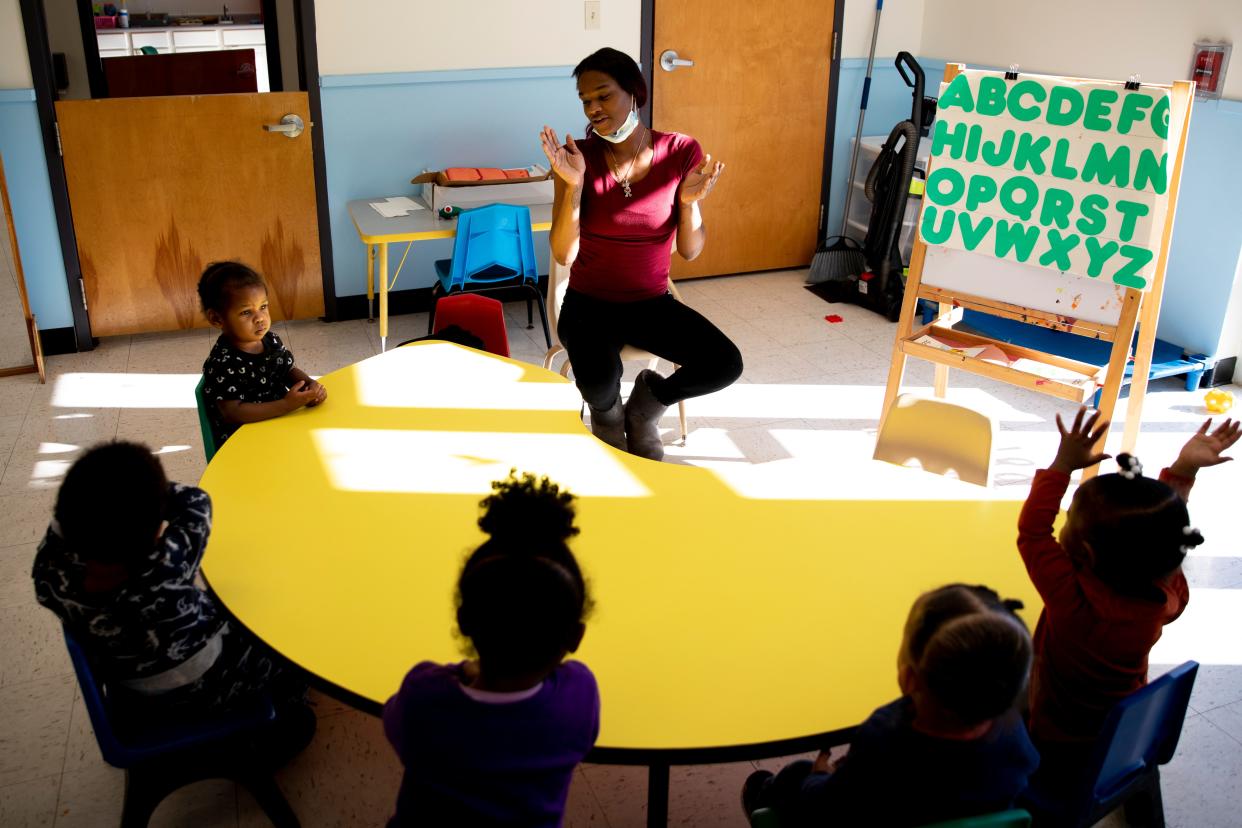Opinion: DeWine must allocate more funding for child care

- Oops!Something went wrong.Please try again later.
Gov. Mike DeWine has said that he wants Ohio to be the best place to raise a family. I concur with him. Every child deserves access to quality childcare and families deserve for that care to be affordable. Early childhood educators deserve to work without wondering whether they’ll be fairly or competitively compensated. And all parents deserve to go to work knowing that their children have a safe place to go that meets their academic and social needs. That is presently not happening.
While childcare is less expensive in Ohio than in most other states, it’s still out of reach for many working families. The average annual cost of childcare for an infant and a four-year-old in Ohio is $17,592. That’s unaffordable for thousands of parents across the state. A single mother of two making $16 an hour spends half her income on childcare and doesn’t have enough left over to pay for groceries, rent, health care, and other basics, according to Policy Matters Ohio. Yet she earns too much to qualify for publicly funded childcare. For Gov. DeWine to live up to his aspiration, he must take several immediate and important steps.
First, he must encourage state policymakers to develop a deeper appreciation of the role of early childhood educators. Too many people think of early childhood educators as babysitters, but they are stimulating the mind in a way that prepares babies and children for future academic success. We know that from birth, babies and children’s brains are malleable and susceptible to learning. Early childhood educators meet the educational, social and cultural needs of children from birth to third grade. We lay the building blocks that ensure children enter schools enthusiastic about learning and capable of learning as well as interacting positively with other children and adults.

Next, policymakers must include early childhood educators during the state budgeting process. Special interests, lobbyists, and legislators will undoubtedly be heard. But early childhood educators should be heard as well. We should have the opportunity to outline what we need. We should be invited to the table to co-create policies that serve the children and families who rely on us to work and to learn, as well as the providers who fuel our economy by ensuring parents can work. There should be an opportunity to offer feedback on policy proposals, and help mitigate punitive policies that undermine children, families, and the skillful hands that care for them.
Additionally, and perhaps most importantly, Gov. DeWine and legislative leaders must allocate sufficient funds in the budget for early education centers (including Type A and Type B family care centers). By way of background, there are three distinctive types of facilities, including commercial centers, and Type A and Type B family care centers. Often, the Type A and Type B facilities are treated worse than centers.
Early childhood providers must have full discretion over how the funds are used. The state should also disclose data measuring the educational outcomes of private and public early education programs. Right now, there is very little transparency around how private and public centers are faring. In addition, the state must increase the tuition rates for PFCC. Finally, the state must allocate funds for workforce development with equity, so early education centers can thrive.
Without a well-funded early education system, children and families will struggle to find quality care. Without a well-funded early education system, educators will be on a perpetual quest for livable wages that allows them to not only care for children inside the early learning center, but to meet the needs of their own families. As it presently stands, early childhood educators are paid so low that many are unable to care for themselves and their own children.
Ohioans value taking care of one other, no matter our skin color, our ability, or how much money we have. But for nearly two decades, our elected officials have passed a state budget that does not meet our needs or provide us with opportunities to thrive. This is true for many people, but it is particularly biting for early childhood educators and providers. For instance, we ensure families can enter the workforce fully assured that their children will be well cared for. These educators deserve immediate inclusion in state retirement benefit programs.

From Toledo to Cincinnati, Akron to Dayton, Ohioans want our families to be safe. Every child deserves access to high-quality education; from birth to high school graduation. To do that, our leaders must provide Ohio’s workers with enough resources to thrive − especially the care workers who help protect, educate and empower our kids. But for too long now, elected leaders have supported harmful policies that do not pay a fair return on early childhood education work and siphon money from early learning centers, while the wealthy few hire expensive help for their own children.
Ohio can truly live up to its potential as a great state if we fund our kids, pay all our workers a living wage, and help our parents afford the child care they need in order to work and provide for their families.
Whether families are from the city, the country, or the suburbs, everyone wins when early childhood education is properly funded. No exceptions. As we move through the budget negotiations process, I want parents and educators to be heard. They deserve a voice in this discussion just like everyone else. I hope Gov. DeWine will help make that happen.
Kathleen Tyler is a early childhood education provider in the Cincinnati, Ohio area.

This article originally appeared on Cincinnati Enquirer: Opinion: DeWine must allocate more funding for child care

